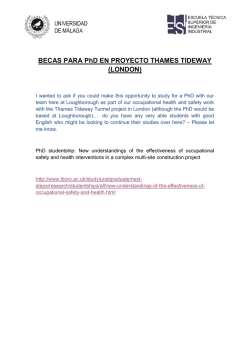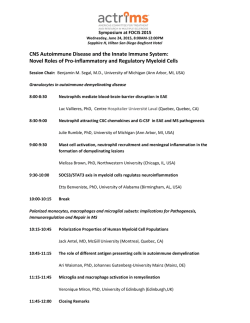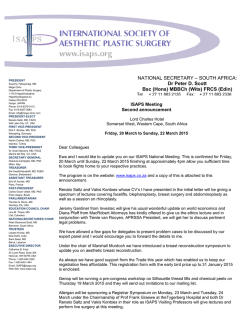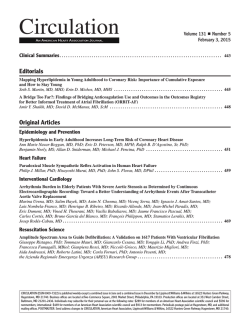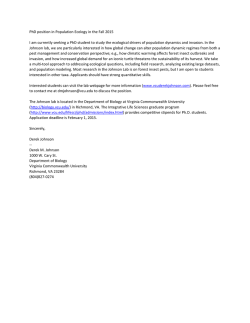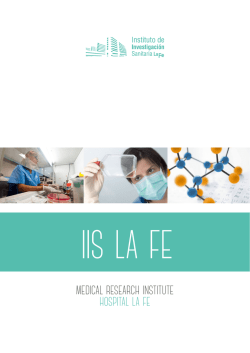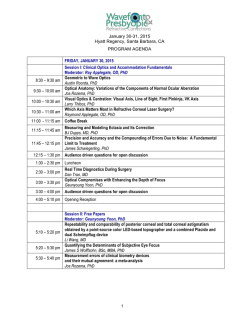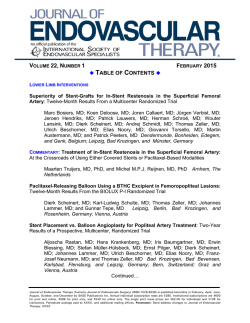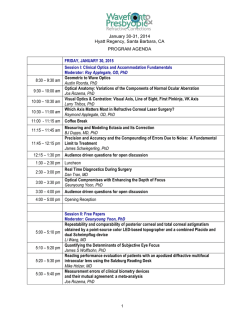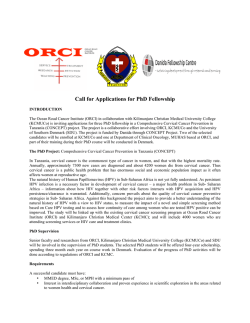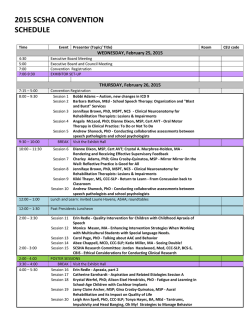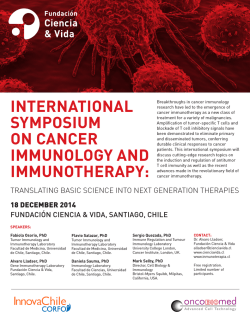
Spring Mini-Course Flyer - Stanford Biosciences PhD Programs
MINI COURSES - SPRING 2015 MINI COURSE DESCRIPTIONS BIOS 204 Practical Tutorial on the Modeling of Signal Transduction Motifs Basics of ordinary differential equation modeling of signal transduction motifs, small circuits of regulatory proteins and genes that serve as building blocks of complex regulatory circuits. Instructor: James Ferrell MD PhD BIOS 201 Next Generation Sequencing and Applications Usher in the golden age of biological discovery with next generation sequencing (NGS) through its wide spectrum of applications. Modules include general introduction of Next Generation Sequencing (NGS) technologies, applications of these sequencing technologies, caveats and comparisons with previous approaches, analysis and interpretation of sequencing data, principles of tools and resources and practical ways to utilize them. Instructors: Jin Billy Li PhD, William Greenleaf PhD, Stephen Montgomery PhD, Alex Urban PhD BIOS 205 Introductory Data Analysis in R for Biomedical Students Topics include the basics of R programming language and data structures, reading/writing files, graphics tools for figure generation, basic statistical and regression operations, survey of relevant R library packages. Interactive format combining lectures and computer lab. Instructor: Steven Bagley MD BIOS 208 Computational Protein Structure Modeling Concepts, workflow, and methodology of protein structure modeling presented through short lectures followed by hands-on exercises with the Rosetta software package. Instructors: Frank Cochran PhD, Rhiju Das PhD BIOS 210 Axonal Transport and Neurodegenerative Diseases Introduction to mechanisms underlying axonal transport, significance of proper regulation in maintaining neuronal activities, and its implication in disease pathology. Lab section: visualize axonal transport of various axonal organelles such as mitochondria, synaptic vesicles and dense core vesicles in live cells and tissues. Instructor: Xinnan Wang PhD BIOS 211 Histology for Biosciences Fundamentals of tissue organization as seen by light microscopy. Includes: epithelium, connective tissue, muscle, bone, cartilage, blood cells, nerve, and quick overview of several major organs. Instructor: Andrew Connolly MD PhD BIOS 213 Scientific Illustration and Animation Techniques of presenting big picture ideas and detailed experiments as simple cartoons. Mixed lecture/lab course culminates with students producing figures and animations for an introduction/conclusion of a research presentation. Instructor: David Schneider PhD BIOS 230 Biomedical Data Analysis in MATLAB The course aims to equip the biomedical scientist or engineer with the computational tools to analyze their data at a basic-to-intermediate level. MATLAB-based implementations of algorithms from linear systems theory, differential equations (ordinary/partial), digital image processing and parameter estimation will be taught; however, emphasis will be laid on applications to biomedicine. Instructors: Michael Convert PhD, Nimit Jain BIOS 231 Neuroimaging Genomics This course will cover the fundamentals of major single-molecule manipulation methods (optical tweezers, magnetic tweezers, and atomic force microscopy), principles of force measurement signal and noise, and applications to studies of folding, binding, polymer elasticity, and structural transitions in proteins and nucleic acids. Instructors: Vanessa Sochat, Dennis Wall PhD BIOS 235 Metabolism and Metabolic Ecology: Microbes, Gut and Cancer Course on modern aspects of metabolism and metabolic biochemistry as it affects fitness and ecology of cells and organisms on a systems level. Students will obtain a broad understanding of the governing principles and logic of metabolic pathways and their networks. Instructor: Alfren Spormann PhD BIOS 236 Developmental Biology in the Ocean: Comparative Embryology and Larval Development Course allows students to immerse themselves in the embryology and larval development a broad range of marine invertebrate phyla. The goal of the course is to give students an appreciation of the range of developmental strategies and larval forms in the ocean and why this is critical for constructing hypotheses of EvoDevo and animal evolution. Instructors: Nat Clarke, Chris Lowe PhD DATE & TIME 6/1- 6/12 • M Tu W Th F 10am-11am & 3pm-5pm CCSR 4107 Units: 2 5/27 - 6/12 • M W 3pm-5pm Alway M206 Units: 2 5/27 - 6/12 • M W F 9am-10:50am LK 304/305 Units: 1 5/27 - 6/12 • M W F 9:00am-11:50am LK 308 Units: 2 5/22 - 6/6 • Th F 10am-11am lecture 2pm-4:30pm lab MSOB X303 Units: 1 or 2 5/26 - 6/11 • Tu Th 2:15pm-4:05pm Alway M208 Units: 1 6/1 - 6/12 • M Tu W Th F 1pm-3pm CCSR 4205 Units: 1 5/26 - 6/12 • M T Th 10am-11:30am Lecture LK 205/206 3pm-5pm Lab Th Alway M214 Units: 2 5/27 - 6/12 • M T W Th F 12:50pm-2:50pm LK 208 Units: 1 6/1 - 6/12• M T W Th F 10am-11am Alway M106 Units: 1 5/27 - 6/12• M T W Th F 9am-5pm Hopkins Marine Station Units: 4 Mini courses listed in Explore Courses • School of Medicine • BIOS • Biosciences Interdisciplinary FLEXIBLE REGISTRATION DEADLINES Classes are open to both graduate students and post doctoral scholars (capped enrollment). For registration visit http://biosciences.stanford.edu/current/curriculum/minicourses-winter.html
© Copyright 2026
